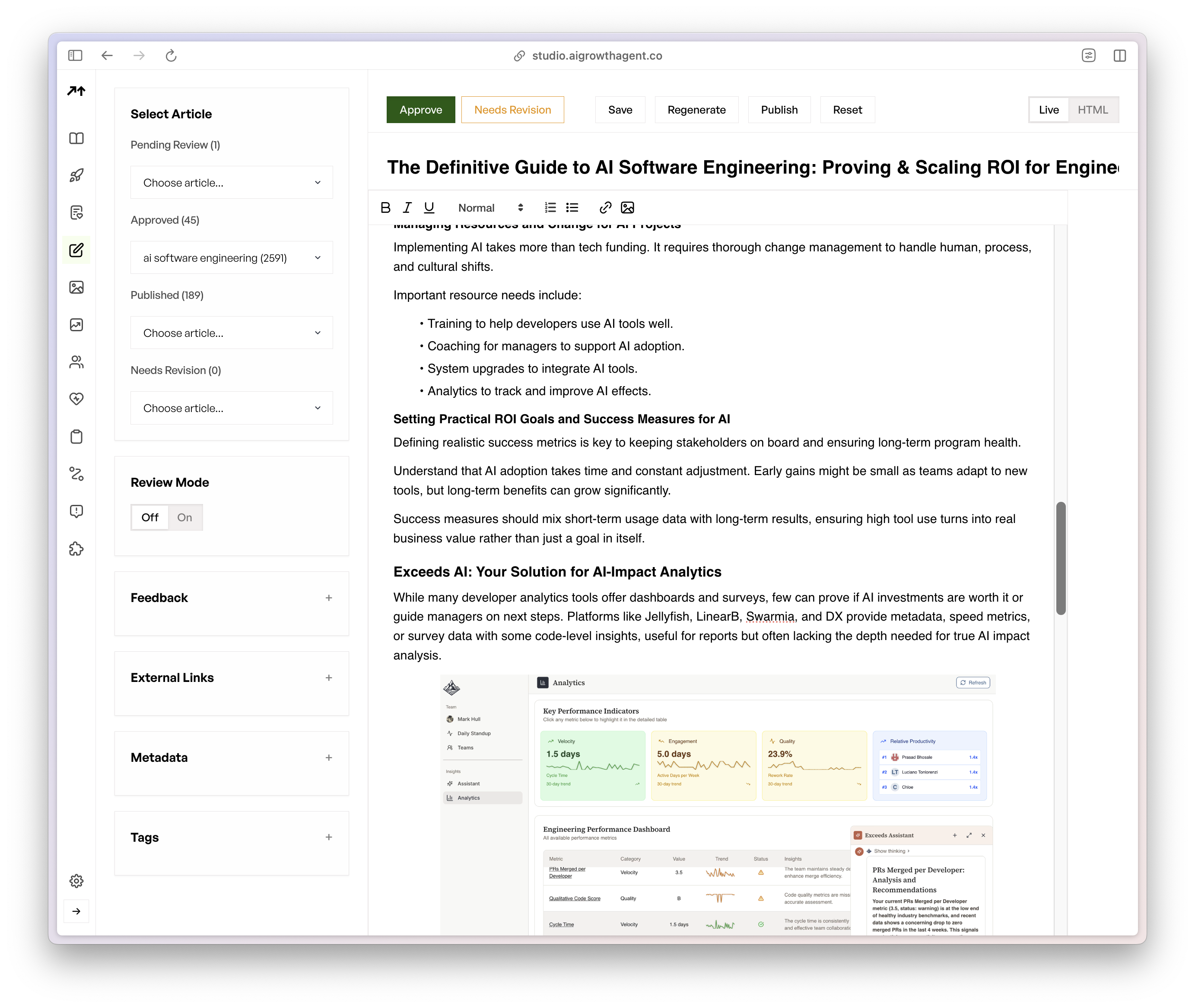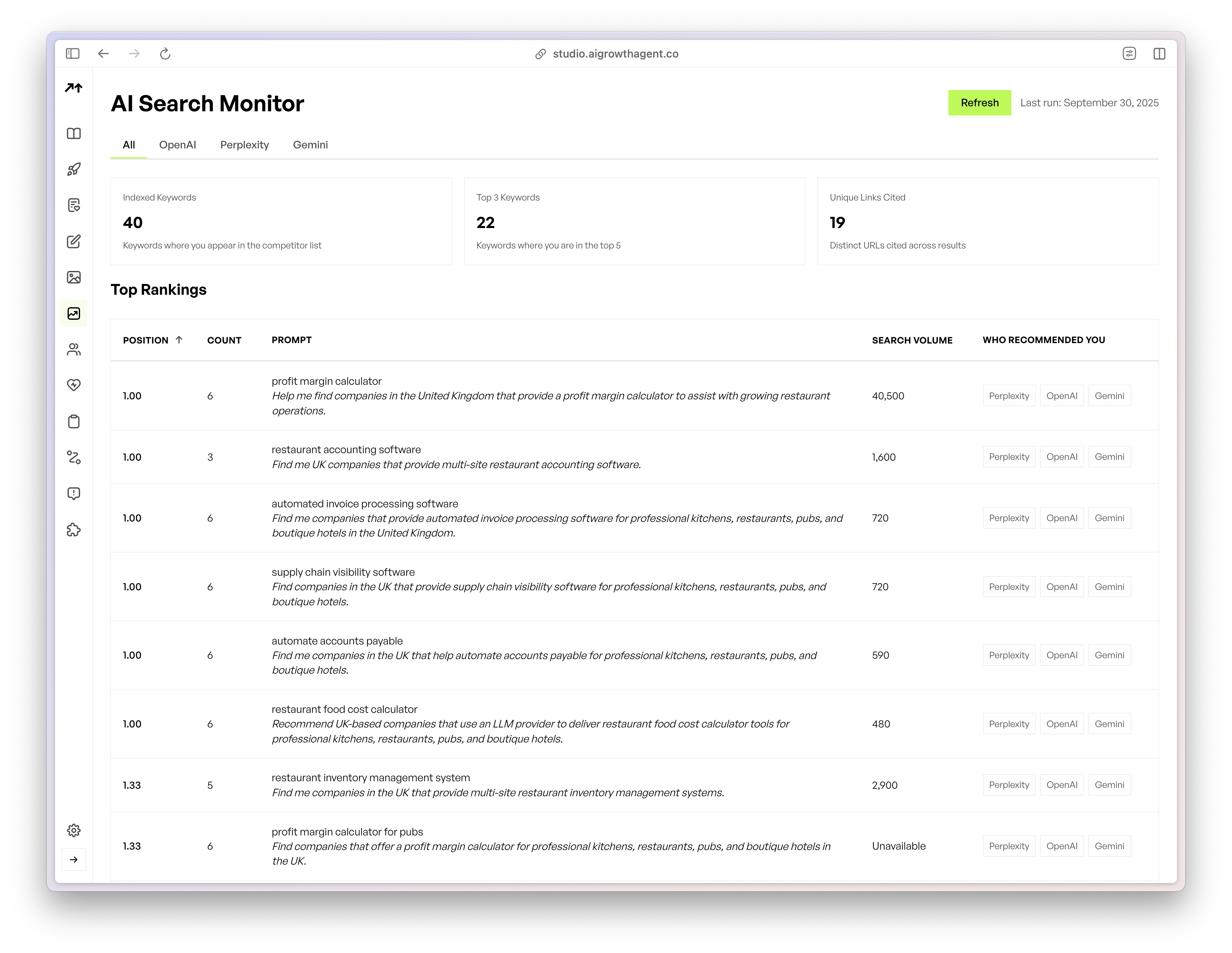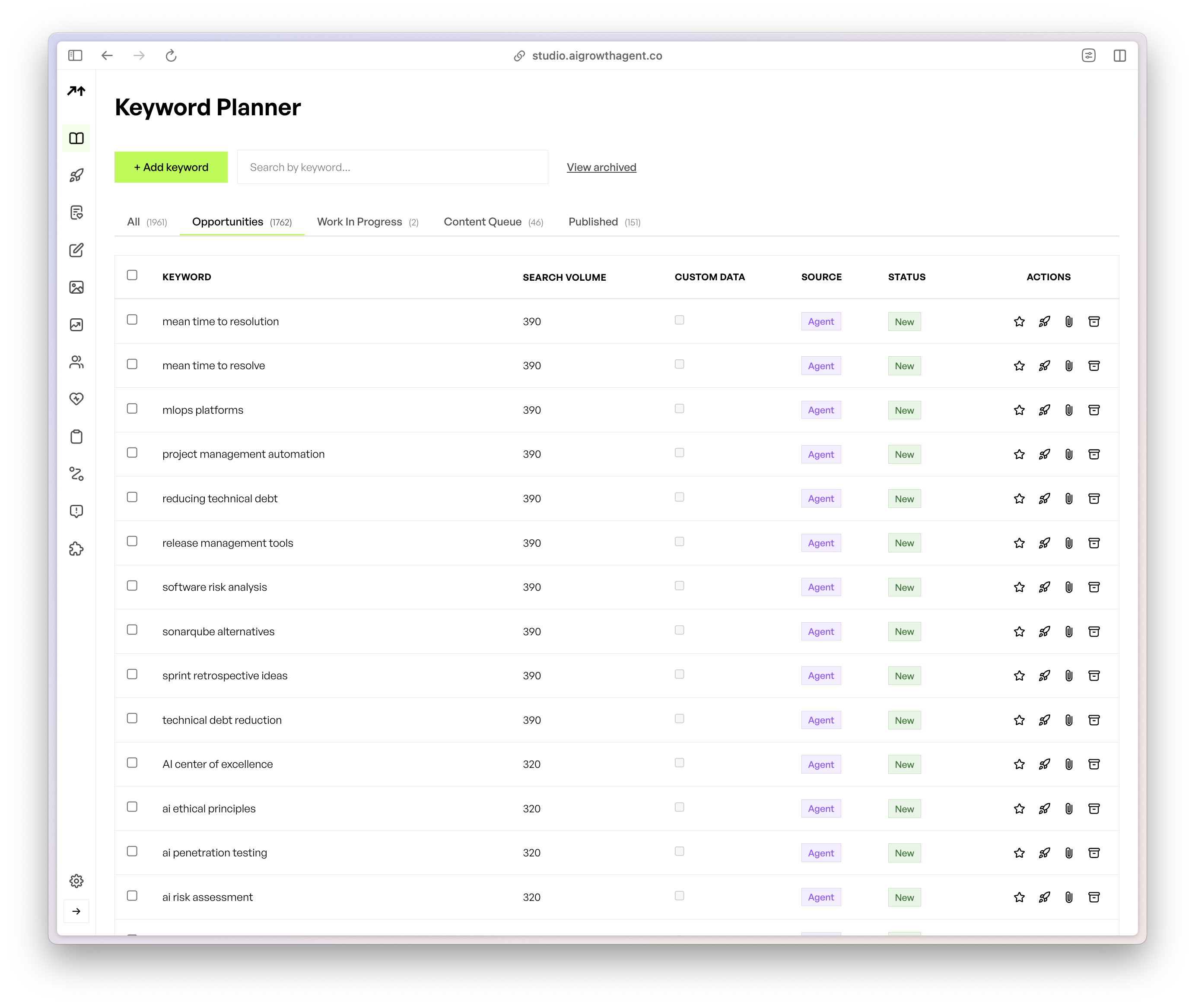Key Takeaways
- AI search systems such as ChatGPT, Gemini, and Perplexity rely on citation visibility and answer quality, not only classic keyword rankings.
- Technical SEO, structured data, and content design now work as one system to make your site easy for large language models to crawl, interpret, and quote.
- Marketing teams gain more value from SEO audits when they connect insights to programmatic content workflows instead of isolated one-off fixes.
- AI-specific metrics, including AI Presence Rate and Citation Authority, help leaders track brand visibility across conversational and AI-assisted search.
- AI Growth Agent turns audit findings into programmatic execution at scale, and you can see it in action by scheduling a demo.
Why Traditional SEO Audits Fall Short in the Age of AI Search
SEO audits that focus only on rankings, keyword density, and basic site health miss how AI systems choose what to cite. Previous playbooks rewarded manual keyword optimization and slow content refresh cycles. AI search instead favors structured, answer-first content that LLMs can quote confidently.
Modern SEO audits now need explicit checkpoints for AI visibility, AI crawler access, and answer extractability. Brands that rely on manual and reactive SEO cannot keep pace with the volume, structure, and authority signals AI search expects in 2026.
Marketing leaders who want to modernize their audits can book a consultation with AI Growth Agent to review AI-first technical and content requirements.
Key Categories of SEO Audit Tools for AI Authority in 2026
Technical SEO and AI Readiness Audit Tools: Ensure Crawler Access and Site Health
Effective AI visibility starts with clean technical foundations. AI-focused audits now confirm that robots.txt allows GPTBot, ClaudeBot, and PerplexityBot to verify server-side rendering for key templates, and check Core Web Vitals, mobile usability, and HTTPS as ingestion prerequisites. Tools such as Screaming Frog, Deepcrawl, and Semrush Site Audit help teams uncover JavaScript rendering issues, broken internal paths, and crawl traps that can block AI access.
Structured Data and Schema Validators: Support Fact Extraction for LLMs
Structured data and schema clarify entities, relationships, and key facts for AI engines. Updated audits review coverage for FAQPage, Article, Organization, HowTo, and Speakable schema across important templates. Tools such as Google Rich Results Test, Schema Markup Validator, and Merkle Schema Generator help teams validate markup so AI models can parse content with less ambiguity.
Content Audit Tools for Topical Authority and Answer-First Optimization
Content that presents concise, direct answers in well-structured sections is more likely to be summarized and cited by AI. Platforms such as Clearscope, MarketMuse, and Semrush Content Audit highlight topical gaps, weak coverage, and formatting issues that limit extractability. Strong AI-ready pages include clear headings, answer-first paragraphs, and 40 to 60 word segments that any model can lift into a response.

Off-Page SEO and Citation Authority Monitors: Build Trust for AI Recommendations
AI systems lean on signals such as backlink profiles, brand mentions, and domain strength when choosing which sources to surface. Tools like Ahrefs, Moz, and BrightEdge track these authority indicators, reveal referring domains by topic, and show whether your brand or competitors earn more trusted mentions in your space.
AI Search Visibility and Citation Monitoring Platforms: Track Your AI Footprint
New metrics, including AI Presence Rate and Citation Authority, now sit beside organic traffic and rankings in enterprise dashboards. Emerging AI visibility tools report where and how often a brand appears inside ChatGPT answers, Google AI Overviews, and Perplexity results. These insights close the loop between content investments and AI-era discoverability.

Integrating SEO Audit Insights into a Programmatic Strategy with AI Growth Agent
Most SEO audit tools stop at reports and task lists. AI Growth Agent connects those findings to autonomous execution, so teams ship AI-ready content architectures instead of living in spreadsheets.
The Programmatic SEO Agent ingests audit outputs such as content gaps, schema requirements, and on-page issues. It then runs keyword clustering, generates answer-first drafts, applies structured data, and publishes at scale, which reduces manual coordination across marketing, content, and engineering.
Marketing teams that want to operationalize this approach can schedule a demo to evaluate AI Growth Agent for programmatic SEO automation.
AI Growth Agent: From Audit to Autonomous Execution
AI Growth Agent acts as an execution engine on top of your audit stack. The system standardizes templates, applies rich metadata and schema, and keeps AI readiness in mind from the start, so every new article aligns with conversational search patterns.
|
Feature |
Traditional SEO Audit Tool |
AI Growth Agent |
|
Primary Function |
Diagnosis and reporting |
Autonomous implementation |
|
Output |
List of issues |
Published, optimized articles |
|
AI Readiness |
Manual follow-up required |
AI-first design and execution |
|
Content Scale |
Limited by team capacity |
Programmatic coverage across topics |

Best Practices for Using SEO Audit Tools for AI Visibility and Programmatic SEO
Adopt an AI-First Auditing Mindset
AI-first audits evaluate how easily models can extract clear answers. Teams review pages for answer-first openings, FAQ sections, and short passages that address specific intents. Competitive analysis now includes checking which structures and formats appear most often in AI answers for target queries.
Implement Continuous Auditing and Monitoring
Continuous AI auditing turns technical SEO into an automated, ongoing process. Automated workflows track AI bot crawl activity, schema validation, and AI platform performance trends. This ongoing feedback allows teams to adjust content and templates before visibility drops.
Prioritize AI Crawler Access
Modern audits confirm that GPTBot, ClaudeBot, and PerplexityBot are allowed in robots.txt and that key pages render completely without client-side JavaScript. Regular log-file reviews show whether AI bots reach your most important content or stall on technical issues.
Measure AI-Specific KPIs
Metrics such as AI Presence Rate, Citation Authority, and Share of AI Conversation provide a clearer view of influence than rankings alone. Teams track how often their brand appears in AI responses, in which contexts, and how that presence compares to direct competitors.
Align Audit Findings with Programmatic Content Sprints
Architecture of Authority frameworks outline content hubs that cover core topics and sub-intents in depth. Strong teams convert audit findings into structured content sprints, using templates that can roll out hundreds of AI-optimized pages rather than a handful of isolated articles.
Common Challenges and Pitfalls in AI-Era SEO Auditing
Many marketing teams still rely on fragmented tools that track rankings but ignore AI citations, or they misread AI signals and assume strong organic traffic guarantees AI visibility. Limited engineering resources also slow implementation of AI-focused recommendations, while rapid AI changes can make manual roadmaps obsolete.
Leaders who want to close this execution gap can set up a session with AI Growth Agent to explore continuous, autonomous AI search optimization.
Frequently Asked Questions (FAQ) About SEO Audit Tools for AI Search
What is the most important difference between audits for traditional search and for AI search?
AI search audits focus on how well content can be extracted and cited. The process reviews answer-first formatting, schema coverage, and AI crawler access, not only keyword targeting and classic ranking factors.
How can I increase the chances that AI search engines cite my content?
Pages need clear authority signals, strong structured data, and concise answers. FAQ sections, 40 to 60-word answer blocks, and allowed access for GPTBot, ClaudeBot, and PerplexityBot give models clean material to quote.
What role does structured data play in AI search visibility?
Structured data helps AI systems understand what each page covers and which facts are reliable. Audits check for robust FAQPage, Article, Organization, HowTo, and Speakable schema so models can extract details with higher confidence.
Conclusion: Build Sustainable Visibility in the AI Search Landscape
AI-driven search in 2026 rewards brands that pair precise audits with programmatic execution. Traditional tools still matter for diagnosing technical and on-page issues, but they no longer suffice on their own for AI-era visibility.
Marketing leaders who invest in AI-first auditing, continuous monitoring, and scalable content operations will steadily grow their share of AI-generated recommendations and citations.
Teams that want to turn this strategy into a practical system can schedule a demo with AI Growth Agent and review how autonomous content engineering supports SEO in the AI search era.